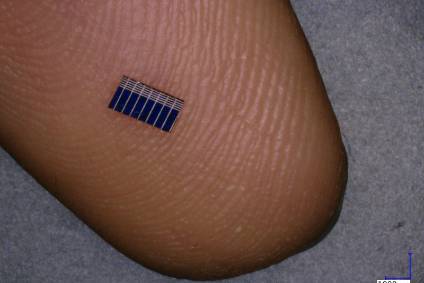
A UK university has developed a technology using “tiny solar cells” that allows the wearer to generate electricity on the move and charge items like phones and smartwatches.
The cells are “the size of a flea,” and can be embedded into yarn that can then be knitted and woven into textiles. Measuring 3mm in length and 1.5mm in width, they are encapsulated in a resin, which allows the textile fabric to be washed and worn like any other form of clothing.

Discover B2B Marketing That Performs
Combine business intelligence and editorial excellence to reach engaged professionals across 36 leading media platforms.
Developed by researchers at the Nottingham Trent University, the technology has been tested and proven to charge a mobile phone and a Fitbit.
“For all intents and purposes, garments appear exactly the same as any other form of clothing despite having the capability to generate electricity.”
Project lead Professor Tilak Dias, of the School of Art & Design, said: “This could do away with the need to plug items into wall sockets and reduce the demand on the grid while cutting carbon emissions. The electrical power demand for smart e-textiles has always been its Achilles heel and this technology will allow people to use smart textiles while on the move.”
Up to 200 miniaturised cells can generate 2.5-10 volts and up to 80 milliwatts in power. The university’s Advanced Textiles Research Group made a proof of concept textile of 5cm by 5cm size with 200 cells.This proved powerful enough to charge a mobile phone and a Fitbit. Researchers say if 2,000 solar cells were incorporated into a textile it would generate enough power to charge a smartphone.

US Tariffs are shifting - will you react or anticipate?
Don’t let policy changes catch you off guard. Stay proactive with real-time data and expert analysis.
By GlobalDataResearcher Achala Satharasinghe, who developed the prototype: “This is an exciting technology which could revolutionise the way we think about solar power, clothing and wearable technology. With the availability of miniaturised solar cells we can generate power in a range of new ways, by utilising things like clothing, fashion accessories, textiles and more.
“It will allow mobile devices to be charged in environmentally-friendly ways which are more convenient for consumers than ever before.”





